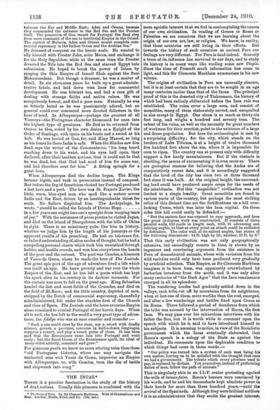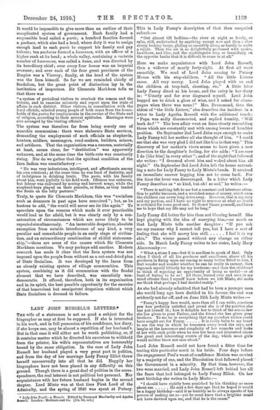THE INCAS.*
THERE is a peculiar fascination in the study of the history of dead nations. Usually this pleasure is combined with the • The Incas of Peru. By Sir Clements Markham. With 16 Illustrations and Map. London: Smith, Elder, and Co. 110a. net.]
more egoistic interest that we feel in contemplating the causes of our own civilisation. In reading of Greece or Rome or Palestine we are conscious that we are learning about the origin of our own art, law, or religion. We know, in reality, that these countries are still living in their effects. But towards the history of such countries as ancient Peru our feelings are very different. For Peru is dead indeed. Scarcely
a trace of its influence has survived to our days, and to study its history is in many ways like reading some new Utopia. Since the time of Prescott much information has come to light, and this Sir Clements Markham summarises in his new
volume.
The origins of civilisation in Peru are unusually obscure, but it is at least certain that they are to be sought in an age many centuries earlier than that of the Incas. The principal proof of this is the deserted city of Tiahuanacu, the history of which had been entirely obliterated before the Inca rule was established. The ruins cover a large area, and consist of monoliths, many of them elaborately carved, and unequalled in size except in Egypt. One stone is as much as thirty-six
feet long, and weighs a hundred and seventy tone. The extent of the ruins, as well as the necessity for great numbers of workmen for their erection, point to the existence of a large and dense population. But here the archaeologist is met by a surprising difficulty ; for the city, which stands on the borders of Lake Titicaca, is at a height of twelve thousand five hundred feet above the sea, where it is impossible for corn to ripen. The country can at present only with difficulty support a few hardy mountaineers. But if the obstacle is startling, the means of surmounting it is even more so. There are geological reasons for believing that the Andes are of comparatively recent date, and it is accordingly suggested that the level of the city has risen two or three thousand feet since it was built. At the original height, the surround-
ing land could have produced ample crops for the needs of the inhabitants. But this " megalithic " civilisation was not
limited to a single locality. Great monoliths are found in
various parts of the country, but perhaps the most striking relics of this distant time are the fortifications on a hill over- looking Cuzco, which was later the Inca capital. On three sides this hill could easily be defended :—
" But the eastern face was exposed to easy approach, and here the great cyclopean work was constructed. It consists of three parallel walls, 330 yards in length each, with 21 advancing and retiring angles, so that at every point an attack could be enfiladed by defenders. The outer wall, at its salient angles, has stones of the following dimensions : 14 ft. high by 12; another, 10 ft. by 6."
That this early civilisation was not only geographically extensive, but exceedingly remote in time, is shown by an ingenious and convincing argument from the existence in Peru of domesticated animals, whose wide variation from the wild varieties could only have been produced very gradually by artificial selection. This Empire, as Sir Clements Markham imagines it to have been, was apparently overwhelmed by
barbarian invasions from the south, and it was only after many centuries of "the Dark Ages " that the Inca renaissance emerged in all its splendour.
The wandering hordes had gradually settled down in the
valleys, each tribe cat off by mountains from its neighbours, when at last one of them, more warlike than the rest, emerged, and after a few wanderings and battles fixed upon Cuzco as its Rome. There followed a period of decadence from which the tribe was aroused by the intervention of Rocca, the first Inca. We may pass over his miraculous interviews with his
father the Sun, but it is worth while to comment upon the speech with which he is said to have introduced himself to his subjects. It is amusing to notice, in view of the Socialistic government which the Incas eventually elaborated, that Rocca's speech is a eulogy of the. State as against the individual. He comments upon the deplorable condition to which things had come in these words :— " Our policy was turned into a system of each man being his own master, leaving us to be satisfied with the thought that once we had a government. The tribute which every province used to pay, is replaced by disdain. You yourselves, instead of performing duties of men, follow the path of animals."
This is singularly akin to an I.L.P. orator protesting against the evils of laissez-faire. Rocca's hearers were convinced by his words, and he and his descendants kept absolute power in their hands for more than three hundred years,—nntil the arrival of the Spaniards. Although they were brilliant soldiers it is as administrators that they excite the greatest interest. It would be impossible to give more than an outline of their complicated system of government. Each family had a responsible head called a puric; a hundred families formed a pachaca, which also had a head, whose duty it was to assign enough land to each purie to support his family and pay tribute ; ten pachacas formed a huaranca, with an officer of a
higher rank at its head ; a whole valley, containing a variable number of huarancas, was called a hunu, and was directed by its hereditary chief ; over every four hunus was an imperial
overseer; and over each of the four great provinces of the Empire was a Viceroy; finally, at the head of the system was the Inca himself. So far we are reminded chiefly of feudalism, but the great point of distinction lay in the
institution of inspectors. Sir Clements Markham tells us that there was
"a system of periodical visitors to overlook the census and the tribute, and to examine minutely and report upon the state of affairs in each district. Other visitors, in consultation with the !teal officials, selected young people of both sexes from the house- holds of the "'aria for employments in the service of the State and of religion, according to their several aptitudes. Marriages were also arranged by the visiting officials."
The system was therefore far from being merely one of anarchic communism: there were elaborate State services, demanding the employment of such officials as shepherds, hunters, soldiers, messengers, road-makers, builders, miners, and artificers. That the organisation was a success, materially at least, seems clear, for " destitution" was apparently unknown, and at the same time the birth-rate was constantly rising. Nor do we gather that the spiritual condition of the Inca Indian was unsatisfactory :-
" He was very industrious, intelligent, and affectionate among his own relations; at the same time he was fond of festivity, and of indulgence in drinking bouts. The puric, with his family about him, went joyfully to his field work. Idleness was unknown, but labour was enlivened by sowing and harvest songs, while the shepherd-boys played on their pineuZ/u, or flutes, as they tended the flocks on the lofty pastures."
Truly, to quote Sir Clements Markham, this was "socialism such as dreamer's in past ages have conceived "; but, as he hastens to add, " the world will never see its like again." To speculate upon the reasons which made it ever practicable would lead us far afield, but it was clearly only by a con- catenation of circumstances which are never likely to be
repeated simultaneously. " An inexorable despotism, absolute exemption from outside interference of any kind, a very peculiar and remarkable people in an early stage of civilisa- tion, and an extraordinary combination of skilful statesman- ship,"—these are some of the causes which Sir Clements Markham mentions. We may perhaps add another. Modern research has made it clear that the Inca system was not imposed upon the people from without as a cut-and-dried plan of State Socialism. It was developed by the Incas from an already existing system of village communities. This
system, combining as it did communism with the feudal element that we have described, was essentially non- democratic. It offered, therefore, both in its organisation and in its spirit, the best possible opportunity for the exercise of that benevolent but omnipotent despotism without which
State Socialism is doomed to failure.







































 Previous page
Previous page